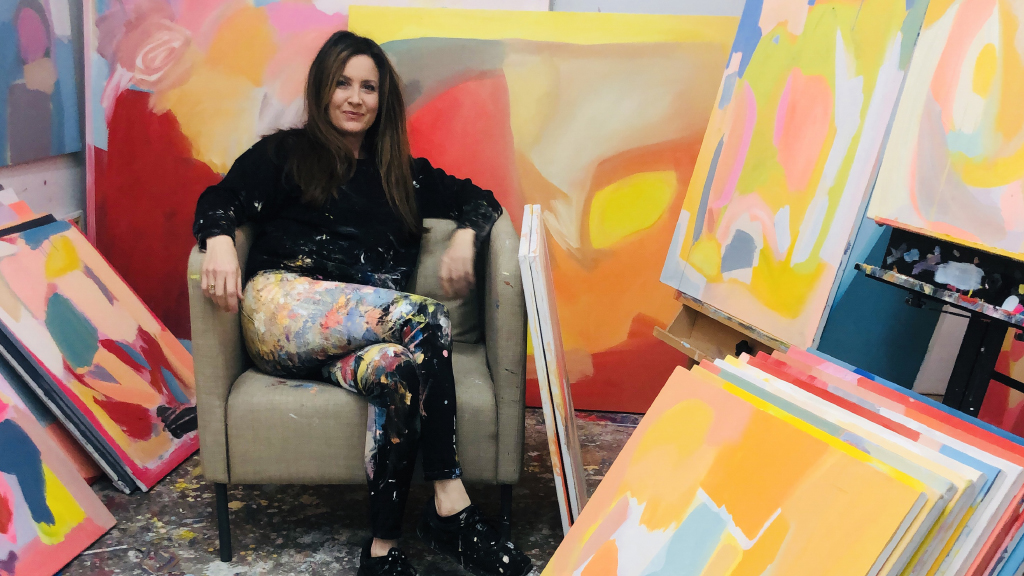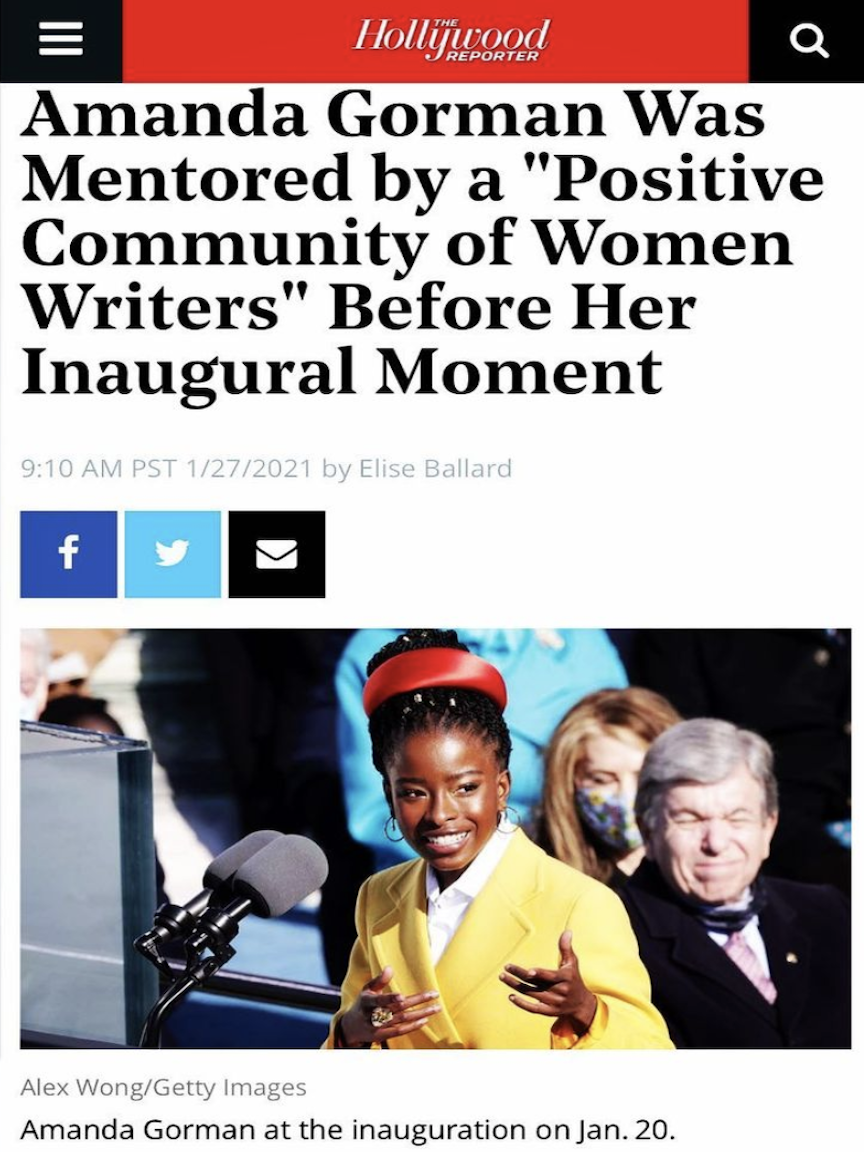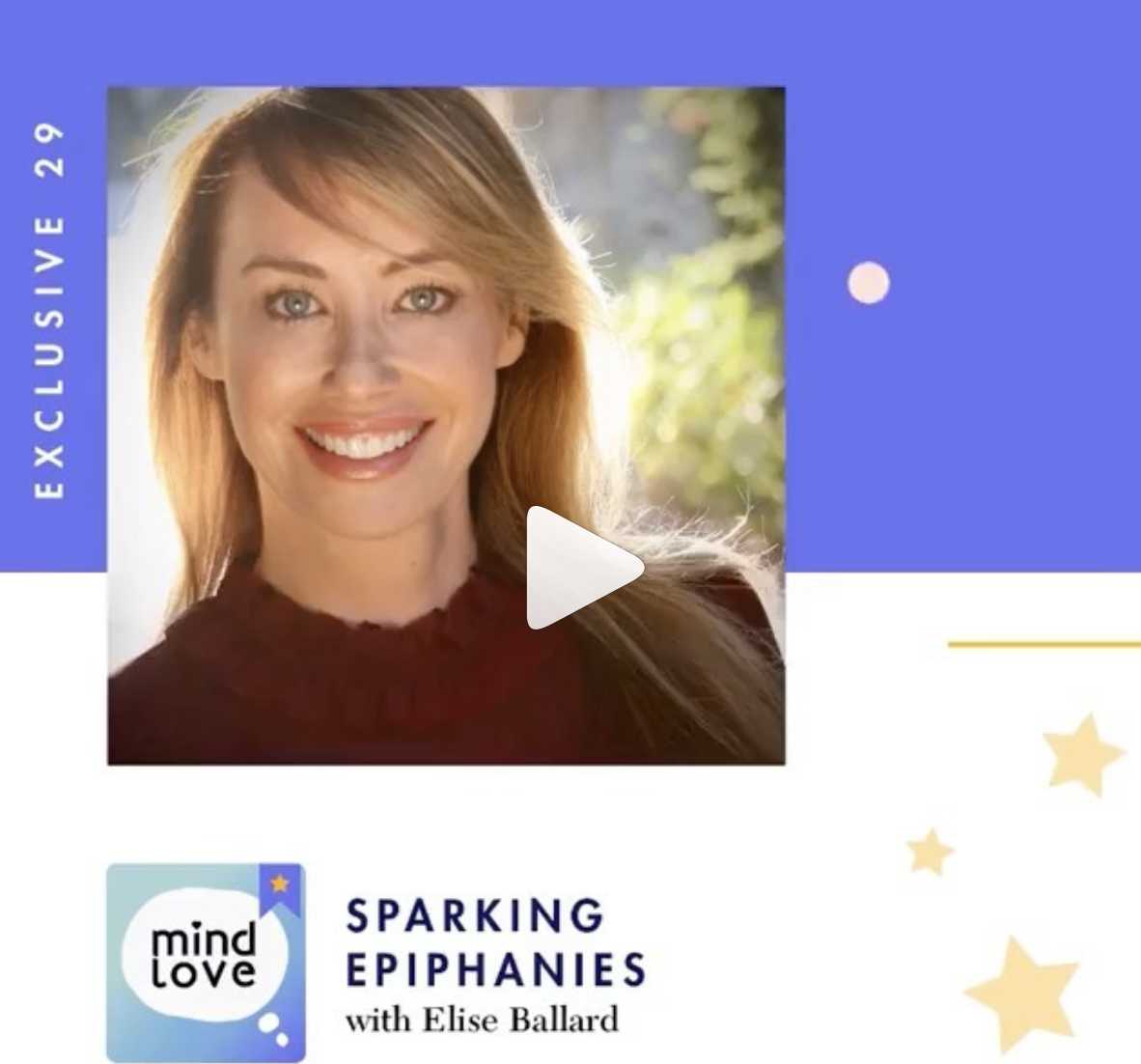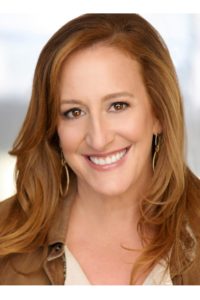 Cindy Chupack is best known as an Emmy-winning TV writer/producer whose credits include Modern Family, Sex and the City, and Everybody Loves Raymond.
Cindy Chupack is best known as an Emmy-winning TV writer/producer whose credits include Modern Family, Sex and the City, and Everybody Loves Raymond.
After her New York Times bestseller The Between Boyfriends Book, her new comic memoir about marriage The Longest Date: Life as a Wife was released by Viking in January 2014 and became available in paperback on December 30, 2014.
Behind-The-Scenes of The Interview
I met Cindy when she was moderating of a panel of women television comedy writers for the Writers Guild Foundation and HUMANITAS in Los Angeles. (She is on the Board of Trustees for HUMANITAS and I am one of the judges for the HUMANITAS prize.) I knew of her because of Sex and the City and loved her first book, Between Boyfriends, but she’s one of those people who is even better and more full of light than you’d anticipated when you see her in action and meet her in person.
For our interview, we met in her apartment that she uses as an office in Marina del Rey and talked for over an hour. She is the most prepared subject I’ve ever interviewed (eight epiphanies written down! a record!) and our conversation ranged from epiphanies from childhood to career to Sex and the City, therapy, marriage, fertility, adoption, non-profits, friendship, story-telling, her latest hilarious and poignant book, The Longest Date, and Buck Henry (who, according to Mike Nichols, has never told the same anecdote twice), and much more.
This conversation was so rich and fun, I have plans to use it as one of my first Epiphany Channel podcasts – so stay tuned for that – and because Cindy’s interview was so full of epiphanies and great anecdotes, I’ve divided it into two installments and did something a little different than what I usually do with my Epiphany interviews and used a Q&A format for this first part. I hope you enjoy and get as much out of it as I have.
Learn more about Cindy at her info-filled, one-page website www.CindyChupack.com and at www.facebook.com/CindyChupack.
Life, Love, Writing, and Marriage, “The Longest Date.”
An Interview with Cindy Chupack
Elise: Let’s start with the question I ask everyone: what would you say has been your greatest epiphany in life?
Cindy: Well, I’ve had several – I have eight here on this list … but this first one, which is maybe the most powerful, that set my course for life, so to speak, happened when I was in 3rd grade.
I grew up in Tulsa, Oklahoma, and had a teacher, Mrs. Davis, who liked my poetry. One day she looked at me and said, “You are a writer.”
Not, “You are good at writing,” or “This is great writing, Cindy,” but “You are a writer.” The way she said it, just using those words, made all the difference in my life.
I was a young kid, I was one of the few Jewish kids in my school – I always had to explain Hanukkah to everyone and always felt like an oddball – and in that moment when she said that to me, something happened. There was something about being called a writer. I liked the sound of it, and it made me feel special. Ever since, my life has been a journey of figuring out what kind of a writer I am, and what kind of things I like writing.
In the 9th grade I wrote an essay about my boyfriend breaking up with me. I remember we passed our essays around in class, and one of his friends told me he was moved by it. So even at that young age, I was exploiting my relationships for my writing and learned, “The pen is mightier than the sword. You may break up with me, but I may write about it!” (laughter)
My epiphany is that everyone has some kind of talent, something they are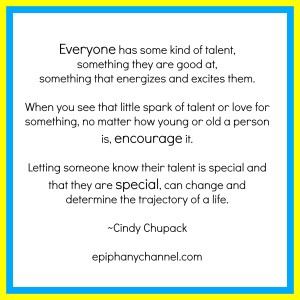 good at, or something that energizes and excites them. When we see a little spark of that talent and love for something, no matter how young a person is, we can encourage it. We can always let a person know that their talent is special and that they are special. Just doing that may end up determining the course of their life.
good at, or something that energizes and excites them. When we see a little spark of that talent and love for something, no matter how young a person is, we can encourage it. We can always let a person know that their talent is special and that they are special. Just doing that may end up determining the course of their life.
Today, as someone who has a child in school, and who works with other writers, this epiphany really resonates with me. I realize how important it is to have someone spot your talent or passion, and authentically and actively encourage it. Even more, I feel that at every age we still have a child in us who is not quite sure what he or she is doing. So in work situations, I try to be genuinely nurturing. It’s always important to be encouraged and to have your work acknowledged, no matter how old or successful you are.
Elise: I love that. It’s incredible how many successful people I’ve interviewed in terms of fulfillment in their careers who were impacted by an adult encouraging and supporting them with developing their gifts and talents. It’s a definite pattern and something I point out in the Preface of my new edition of Epiphany because I think it’s so important for us, especially for parents, to be aware of it.
Tell us about your latest book, The Longest Date – it has a lot of “aha!” moments in it.
My first book, The Between Boyfriends Book, was like Sex and the City and the magazine writing I was doing at the time and was all about dating. It takes you from break up to your next boyfriend and through every “single” stage in between. But the impetus to write my new book, The Longest Date: My Life as a Wife was that when I got married at 40, I had said, “I wish we had five years just to be a couple. But we’re 40 so we have to try to have a child right away.” And then it took us five years plus to have a kid, so the question was, “What did I learn?”
I wanted to write about marriage in the way I’ve written about dating, in a tone that was funny and accessible, and I wanted to include the fertility journey we’d gone on. I couldn’t find anything like that, that was comforting to me while I was going through the trying process of “trying.” There were some books by women who had arrived at the end of the journey, who had finally found the baby or gotten pregnant. (And by the time I finished writing the book, we did have a happy ending — we adopted a little girl.) But in my case, I didn’t write it from that happy ending backwards. I wrote this book while I was still going through it, not knowing what the ending would be. I sold the book and started writing it when I had no idea how things would work out for us. I wanted to write it for people who were still in the middle of the process.
That’s been the most rewarding part on this book tour — when people write me about how my story touched them, or how they have a friend going through fertility treatments or infertility that the book helped. I’m particularly proud to be there to comfort people going through that process.
I was also very encouraged to hear that it has helped some couples talk to each other about what they’re thinking and feeling. One woman told me she had wanted to adopt, but her husband wasn’t really open to that yet, and she wasn’t sure how to make the case. The book helped open a dialog.
E: So did you pitch the book and say, “I’m trying to have or adopt a baby, and I’d like to do a book on this process,” and the publisher bought it?
Yes, well, that’s another epiphany. I’ve had many of them in my therapist’s office – she’s seen me through a divorce, every boyfriend after that, and now my marriage. My husband and I have seen her together to solve some problems, like when we were deciding if we were going to get a Saint Bernard. Seriously. (laughter)
I originally started seeing this therapist because I was married to a man for two years who then realized he was gay. After that I was single for a long, long time.
When my divorce happened, it seemed like the end of my life. I thought I was going to be married to this guy for the rest of my life, and we were going to have kids… And then suddenly, that life I’d thought I was living was ending. But what I eventually realized was, it really was a beginning.
Because I was single for such a long time after that, it became the basis of a lot of what I wrote about. I never would have written on Sex and the City if my life hadn’t fallen apart. I might have written, but not on that show, which really helped define who I am as a writer. It was so much fun, and it made me feel so not alone. There was a purpose to my being single. I was sharing stories that I needed to share.
E: That’s what Sex and the City did for me when I went through my separation and divorce – made me not feel so alone. And gave me different epiphanies about dating actually. I’d been out of the dating scene for ten years so lots had changed and I was clueless.
It did that for me too, writing for it. I once heard at a screenwriting seminar: “Write about something that is still a question for you.” In this new book, I didn’t have the answer yet as to how we were going to have our child, or if we’d even have one. Back when I wrote for Sex and the City, every episode was a question, but they were questions to which I really wanted the answers. I think there is something about writing what you are still wondering about that is so healing and interesting and helpful.
When I first got married to Ian, I was afraid my writing career was over. It didn’t seem like such a noble quest to me, to be married. Everybody can root for someone who is single and trying to find love, but I worried about writing about marriage. Then my therapist reminded me, “You didn’t know you were going to write about dating when you first came in here. You had written maybe one essay about it and eventually found a voice and a point of view on being single. You might find that you just don’t know yet what your feeling is about marriage.”
And as usual, she turned out to be right. I was newly married, so I didn’t have a real perspective on it then, but I have a lot to say on the subject now.
I wrote a few pieces that involved being married, like our first holiday together as Jews when we’d decided to celebrate Christmas as a kind of “No-No Noel,” and about this snow machine my husband got me one year, and some essays about me starting to try to have a child, which all ended up being in the book.
So once again, I realized that, just as the ending of my first marriage was really the beginning of an incredible new chapter for me about being single — getting married again ended that chapter, but began a whole new adventure for me. I wrote in my book proposal, “Hopefully there will be a happy ending to this story. Then again, I know it won’t be an ending. It will be another beginning.” And, of course, it was.
E: What is your greatest epiphany about ROMANCE and MARRIAGE? (You knew I had to ask that!)
One of my best friends, Marie, always says, “A relationship should feel like you’re both getting a great deal,” and this really resonates with me. I feel like I have always been searching for a rule about love and relationships that makes sense to me, and this one does. When you get married, you and your spouse should both feel like you are getting a great deal.
I had more commitment phobia than I realized, after one failed marriage. I was afraid that in marriage, my life would get smaller and I would become boring.
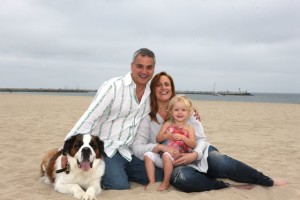 Well, I married someone with whom that will never happen, for better or worse, and I think in the book you can see the downside of that as well. But our lives definitely got bigger, not smaller, and so my epiphany about marriage is that it doesn’t have to mean you get boring and you become like everyone else. It means that your life is an adventure for two. (Or now that I have a daughter, three… plus a St. Bernard!)
Well, I married someone with whom that will never happen, for better or worse, and I think in the book you can see the downside of that as well. But our lives definitely got bigger, not smaller, and so my epiphany about marriage is that it doesn’t have to mean you get boring and you become like everyone else. It means that your life is an adventure for two. (Or now that I have a daughter, three… plus a St. Bernard!)
E: In the book, you tell the story of how you and your husband met at a storytelling event in New York. How often do you read in storytelling events? You have several recorded ones from the well-known MOTH series on your website.
Well, I did them a lot when I was writing my book, just to get a feel for how an audience is responding. Sometimes I would add jokes on the fly when I was telling it, or I would realize I had lines that I didn’t need, or there would be chapters of the book that I didn’t want to read out loud in front of an audience. This made me think, “Why don’t I want to read that one? Why am I reading all these others over and over, and not that one? Is it not funny enough? Is it not interesting enough?” And that helped me identify and reshape the weaker chapters.
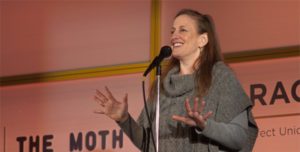 I love storytelling, and it inspires me to hear other people’s stories – like the epiphany stories you’re collecting. I find people’s true stories — as told by them — so inspiring. It makes you feel part of the world when you can hear people from all different walks of life, and learn about our hopes and dreams, our epiphanies – we all have them. As I was listening to many epiphanies on your site — I kept remembering other things. I think that’s the beauty of them — they jog your memory of other moments.
I love storytelling, and it inspires me to hear other people’s stories – like the epiphany stories you’re collecting. I find people’s true stories — as told by them — so inspiring. It makes you feel part of the world when you can hear people from all different walks of life, and learn about our hopes and dreams, our epiphanies – we all have them. As I was listening to many epiphanies on your site — I kept remembering other things. I think that’s the beauty of them — they jog your memory of other moments.
I also think there is at least a teeny little epiphany in any good story. You are talking about something that changed you, or something that was an important moment in any good story. So I’m always asking, “Why am I telling this story? What have I learned?” A lot of times a good story starts with a crisis point.
Most of my essays, especially in this book, all start with some kind of crazy, vivid moment like, “I found my husband rappelling down the side of a building. How did we get here?” Then I go back and explore. I love to try to find those insightful or important moments.
E: You do a lot of service work. You mentor people, you’re on the Board of Trustees for HUMANITAS, and you started an organization called Tea and Empathy (www.teaandempathyla.org). Could you talk about that?
Tea and Empathy came out of a cocktail party I threw with my husband when we wanted to raise awareness for the Center for Constitutional Rights. (My husband is a criminal defense lawyer and he’s defended Guantanamo Bay detainees through CCR.) We thought, “We’ll have to sneak in the social consciousness,” because we were going to have Vince Warren who runs that organization talk at this party. But we were wrong – people were eager to hear what Vince had to say; they even wanted to ask questions.
A few days later, I went on a bike ride with a friend from college and she said she wanted to do a party like the one we had just thrown to raise awareness for the foster care organization she was working with, CASA (Court-Appointed Special Advocates). I was on the advisory board of FINCA International (The Foundation for International Community Assistance), which does microfinance all over the world, and I was passionate about that. Another friend was passionate about a fund for Chinese orphanages because she’d adopted her child from China.
We brainstormed and came up with the idea of Tea and Empathy: Once every two months, we would have some of our friends over and introduce them to a new charitable organization. We could pick anything that we were passionate about, and all of our members were welcome to suggest and organize speakers and organizations to highlight. Everyone would bring food, we’d have tea, and we would hear from a speaker.
An epiphany came out of this for me as well because in the beginning, I was afraid that hearing about all of these causes that needed help in our city and in different areas of the world might be too depressing and overwhelming for people. But it was the exact opposite. For every problem that we learned of, or became more educated about, we were talking to the people who were part of the solution. I realized that people are energized and inspired, not depleted, when they are invited to be part of the solution.
We’ve had about thirty meetings now and put up a website so people in other cities could borrow the format. Revelations come out of these simple events all the time for our members because not only do we raise money and awareness for different organizations, but each tea makes you think about what you really care about, and it’s empowering to realize we can all impact and create significant change in the world as individuals and as a group.
To start your own Tea and Empathy group or get involved: www.teaandempathyla.org
***
final note from Elise:
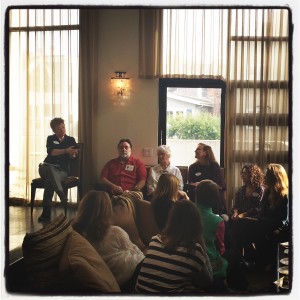 I had the opportunity to go to a Tea and Empathy event last month for Hedgebrook, the wonderful non-profit that “radically nurtures” women writers (any woman writer reading this, you must check Hedgebrook out. I could do a whole blog about them and probably will!) held at Cindy’s beautiful home – it’s THE house in The Longest Date. (When you read it, you’ll know what I’m talking about.) Besides meeting a bunch of amazing women and one man, fellow writers, and learning and being completely inspired – which included acquiring one of their beautiful
I had the opportunity to go to a Tea and Empathy event last month for Hedgebrook, the wonderful non-profit that “radically nurtures” women writers (any woman writer reading this, you must check Hedgebrook out. I could do a whole blog about them and probably will!) held at Cindy’s beautiful home – it’s THE house in The Longest Date. (When you read it, you’ll know what I’m talking about.) Besides meeting a bunch of amazing women and one man, fellow writers, and learning and being completely inspired – which included acquiring one of their beautiful 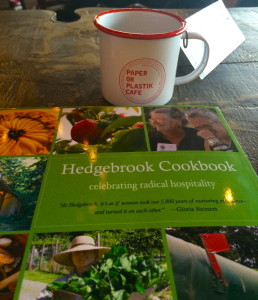 cookbooks, a first for me but one of my new year’s resolutions is to cook more (or sometimes) – I couldn’t help but ponder, “I wonder where the snow machine was…”
cookbooks, a first for me but one of my new year’s resolutions is to cook more (or sometimes) – I couldn’t help but ponder, “I wonder where the snow machine was…”
There are many more enlightening, funny and poignant epiphanies of Cindy’s I’ll be posting (she had 8, remember?) about writing, friendship, losing a loved one, the ripple effect, and the one I mentioned about Buck Henry and never telling an anecdote twice! That’s right…can you imagine NEVER telling an anecdote more than once? I can’t, but next week’s blog will have the epiphany about THE HIGH-OCTANE OBSERVER AND WORKING MIND and answers the question: “Is it possible to never tell a story twice?”
What do you think? Are you like Buck Henry, a one-time anecdote-teller, or more like us “anecdote-repeaters”?
To be continued…HERE. (Part II of the interview)


